HLTH 4000 (HLTH4000)
Walden University
Page 2 out of 51 results
Sort by
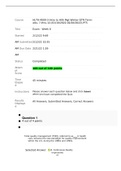
-
HLTH 4000-3 Week 6 Final Exam; Score; 100 Points (Feb 2022)
- Exam (elaborations) • 15 pages • 2022
-
- $22.49
- + learn more
1. Question: Total quality management (TQM), referred to as in health care, became the new paradigm for quality improvement within the U.S. during the 1980s and 1990s. 2. Question: Strategic plans translate broad strategies into specific objectives and action plans. 3. Question: Patients are most likely to complain about the medical care they receive far more than about food or noise or other nonclinical concerns. 4. Question: Which of the following stakeholder groups ...

-
HLTH 4000-3 Week 6 Final Exam Answers; Score; 100 Points (Winter QTR)
- Exam (elaborations) • 16 pages • 2022
-
- $22.49
- + learn more
1. Question: Without planning, a task that must be done usually takes more time than it would if planning preceded its performance. 2. Question: Whenever possible, you should give your employees the authority to address and resolve customer complaints. 3. Question: What is the purpose of the planning assumptions in development of the volume forecast? 4. Question: A plan should include the planner's assessment of how customers and employees may be affected by changes caused by the plan. 5. Q...
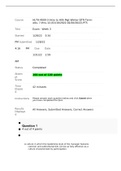
-
HLTH 4000-3 Week 3 Midterm Exam (Score; 100 Points)
- Exam (elaborations) • 15 pages • 2022
-
- $22.49
- + learn more
1. Question: A culture in which the leadership style of the manager features ... culture characterized by participation 2. Question: The second strongest form of leadership is leadership by example. 3. Question: The administration of a budget is an integral part of the basic management function of coordinating. 4. Question: To encourage a service-oriented culture, effective supervisors: 5. Question: The fundamentals of consensus decision making do not include:. 6. Question: The supervisor'...

-
HLTH 4000-3 Week 6 Final Exam Answers; Score; 100 Points (Winter QTR).docx
- Exam (elaborations) • 16 pages • 2022
-
- $25.48
- + learn more
1. Question: Without planning, a task that must be done usually takes more time than it would if planning preceded its performance. 2. Question: Whenever possible, you should give your employees the authority to address and resolve customer complaints. 3. Question: What is the purpose of the planning assumptions in development of the volume forecast? 4. Question: A plan should include the planner's assessment of how customers and employees may be affected by changes caused by the plan. 5. Qu...
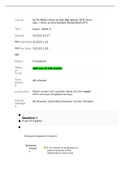
-
HLTH 4000-3 Week 6 Final Exam; Score; 100 Points (Spring 2022)
- Exam (elaborations) • 16 pages • 2022
-
- $25.48
- + learn more
1. Question: Employee Suggestion Programs: 2. Question: Major federal law affecting HR primarily addresses: 3. Question: A "health service [that has] risks [that] outweigh its benefits" is the definition of which of the following terms? 4. Question: There are some health care provider organizations that have no internal customers. 5. Question: What is the department manager's role in strategic planning? 6. Question: Total quality management (TQM), referred to as in health care, became the n...
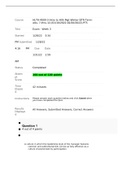
-
HLTH 4000-3 Week 3 Midterm Exam (Score; 100 Points)
- Exam (elaborations) • 15 pages • 2022
-
- $25.48
- + learn more
1. Question: A culture in which the leadership style of the manager features ... culture characterized by participation 2. Question: The second strongest form of leadership is leadership by example. 3. Question: The administration of a budget is an integral part of the basic management function of coordinating. 4. Question: To encourage a service-oriented culture, effective supervisors: 5. Question: The fundamentals of consensus decision making do not include:. 6. Question: The supervisor'...
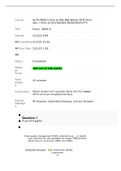
-
HLTH 4000-3 Week 6 Final Exam; Score; 100 Points (Feb 2022)
- Exam (elaborations) • 15 pages • 2022
-
- $25.48
- + learn more
1. Question: Total quality management (TQM), referred to as in health care, became the new paradigm for quality improvement within the U.S. during the 1980s and 1990s. 2. Question: Strategic plans translate broad strategies into specific objectives and action plans. 3. Question: Patients are most likely to complain about the medical care they receive far more than about food or noise or other nonclinical concerns. 4. Question: Which of the following stakeholder groups ...
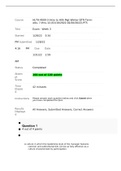
-
HLTH 4000 Special Topics in Public Health Week 3 Midterm Exam
- Exam (elaborations) • 15 pages • 2022
-
- $15.99
- + learn more
1. Question: A culture in which the leadership style of the manager features ... culture characterized by participation 2. Question: The second strongest form of leadership is leadership by example. 3. Question: The administration of a budget is an integral part of the basic management function of coordinating. 4. Question: To encourage a service-oriented culture, effective supervisors: 5. Question: The fundamentals of consensus decision making do not include:. ...
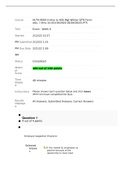
-
HLTH 4000 Introduction to Healthcare Management Week 6 Final Exam (100 points) v1
- Exam (elaborations) • 16 pages • 2022
-
- $15.99
- + learn more
1. Question: Employee Suggestion Programs: 2. Question: Major federal law affecting HR primarily addresses: 3. Question: A "health service [that has] risks [that] outweigh its benefits" is the definition of which of the following terms? 4. Question: There are some health care provider organizations that have no internal customers. 5. Question: What is the department manager's role in strategic planning? 6. Question: Total quality management (TQM), refe...
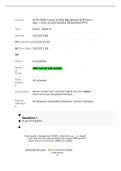
-
HLTH 4000 Introduction to Healthcare Management Week 6 Final Exam (100 points)v2
- Exam (elaborations) • 15 pages • 2022
-
- $15.99
- + learn more
1. Question: Total quality management (TQM), referred to as in health care, became the new paradigm for quality improvement within the U.S. during the 1980s and 1990s. 2. Question: Strategic plans translate broad strategies into specific objectives and action plans. 3. Question: Patients are most likely to complain about the medical care they receive far more than about food or noise or other nonclinical concerns. 4. Question: Which of the following stakeholder groups ...

That summary you just bought made someone very happy. Also get paid weekly? Sell your study resources on Stuvia! Discover all about earning on Stuvia


